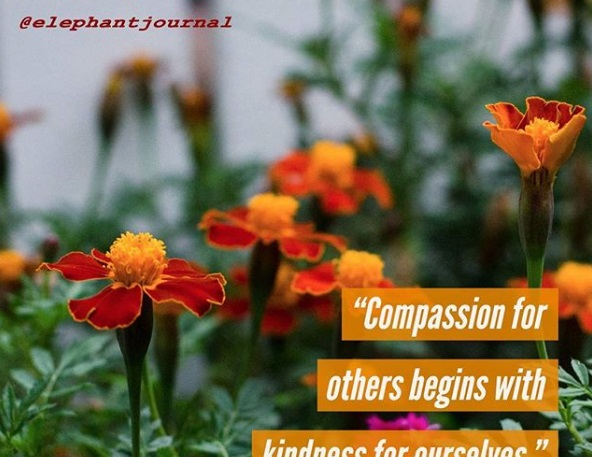Pema Chödrön is a national treasure.
She is a beacon of love, light and practical wisdom.
She is a 77-year-old bestselling author who has been a devoted teacher and student of the Shambhala tradition and a fully-ordained Buddhist nun for decades.
Born in New York in 1934, she found the Buddhist teachings in the wake of her second divorce, when her personal illusion of reality crumbled. Her main teacher was Chogyam Trungpa Rinpoche from 1974 until his death in 1987. She now studies with the Venerable Lama Dzigar Kongtrul Rinpoche. She is the director of Gampo Alley, a Buddhist monastery in Nova Scotia.
I first started reading her books about ten years ago, and she is probably my single favorite spiritual nonfiction author. Her words are like medicine and her advice is genuine, touching and practical–and not just in a sweet grandmotherly way. Some of the teachings are tough, but Pema presents them in an extremely digestible form.
If you don’t know Pema, I hope these inspiring quotes from several of her books will whet your appetite for more Tibetan Buddhist teachings and meditation practices.
If you do, surely you’ll appreciate these tidbits and reminders as well.
From The Wisdom of No Escape:
“When you meet the Buddha, kill the Buddha” means that when you see that you’re grasping or clinging to anything, whether conventionally it’s called good or bad, make friends with that. Look into it. Get to know it completely and utterly. In that way it will let go of itself.
There isn’t any hell or heaven except for how we relate to our world. Hell is just resistance to life.
Being satisfied with what we already have is a magical golden key to being alive in a full, unrestricted, and inspired way.
We all know what addiction is; we are primarily addicted to ME. Interestingly enough, when the weather changes and the energy flows through us, just as it flows through the grass and the trees and the moose and the ocean and the rocks, we discover that we are not solid at all.
The essence of the fourth noble truth is the eightfold path. Everything we do–our discipline, effort, meditation, livelihood, and every single thing that we do from the moment we’re born until the moment we die–we can use to help us to realize our unity and our completeness with all things. We can use our lives, in other words, to wake up to the fact that we’re not separate: the energy that causes us to live and be whole and awake and alive is just the energy that creates everything, and we’re part of that. We can use our lives to connect with that, or we can use them to become resentful, alienated, resistant, angry, bitter. As always, it’s up to us.
From Taking the Leap:
For each and every one of us, intelligence, warmth, and openness are always accessible.
The next time you lose heart and you can’t bear to experience what you’re feeling, you might recall this instruction: change the way you see it and lean in. That’s basically the instruction that Dzigar Kongtrül gave me. And I now pass it on to you. Instead of blaming our discomfort on outer circumstances or on our own weakness, we can choose to stay present and awake to our experience, not grasping it, not buying the stories that we relentlessly tell ourselves. This is priceless advice that addresses the true cause of suffering–yours, mine, and that of all living beings.
The most difficult times for many of us are the ones we give ourselves.
What we hate in ourselves, we’ll hate in others. To the degree that we have compassion for ourselves, we will also have compassion for others. Having compassion starts and ends with having compassion for all those unwanted parts of ourselves, all those imperfections that we don’t even want to look at. Compassion isn’t some kind of self-improvement project or ideal that we’re trying to live up to.
When something is precious, instead of holding it tightly, we can open our hands and share it.
When we think that something is going to bring us pleasure, we don’t know what’s really going to happen. When we think something is going to give us misery, we don’t know. Letting there be room for not knowing is the most important thing of all.
The next time you encounter fear, consider yourself lucky. This is where the courage comes in. Usually we think that brave people have no fear. The truth is that they are intimate with fear.
The most fundamental aggression to ourselves, the most fundamental harm we can do to ourselves, is to remain ignorant by not having the courage and the respect to look at ourselves honestly and gently.
You are the sky. Everything else – it’s just the weather.
From Practicing Peace in Times of War:
When you open yourself to the continually changing, impermanent, dynamic nature of your own being and of reality, you increase your capacity to love and care about other people and your capacity to not be afraid. You’re able to keep your eyes open, your heart open, and your mind open. And you notice when you get caught up in prejudice, bias, and aggression. You develop an enthusiasm for no longer watering those negative seeds, from now until the day you die. And, you begin to think of your life as offering endless opportunities to start to do things differently.
From The Places That Scare You:
That nothing is static or fixed, that all is fleeting and impermanent, is the first mark of existence. It is the ordinary state of affairs. Everything is in process.
Self-improvement can have temporary results, but lasting transformation occurs only when we honor ourselves as the source of wisdom and compassion.
Practicing compassionate inquiry into our reactions and strategies is fundamental to the process of awakening.
Compassion is not a relationship between the healer and the wounded. It’s a relationship between equals. Only when we know our own darkness well can we be present with the darkness of others. Compassion becomes real when we recognize our shared humanity.
From Start Where You Are:
Life is glorious, but life is also wretched. It is both. Appreciating the gloriousness inspires us, encourages us, cheers us up, gives us a bigger perspective, energizes us. We feel connected. But if that’s all that’s happening, we get arrogant and start to look down on others, and there is a sense of making ourselves a big deal and being really serious about it, wanting it to be like that forever. The gloriousness becomes tinged by craving and addiction. On the other hand, wretchedness–life’s painful aspect–softens us up considerably. Knowing pain is a very important ingredient of being there for another person. When you are feeling a lot of grief, you can look right into somebody’s eyes because you feel you haven’t got anything to lose–you’re just there. The wretchedness humbles us and softens us, but if we were only wretched, we would all just go down the tubes. We’d be so depressed, discouraged, and hopeless that we wouldn’t have enough energy to eat an apple. Gloriousness and wretchedness need each other. One inspires us, the other softens us. They go together.
Bonus: a list of the 59 lojong slogans as taught by Pema in Start Where You Are and elsewhere. She has written many other books not included on this list.
P.S. Do you have a favorite Pema quote? Please share it in the comments section.
Like elephant Buddhadharma on Facebook.
Ed: Bryonie Wise







Read 0 comments and reply